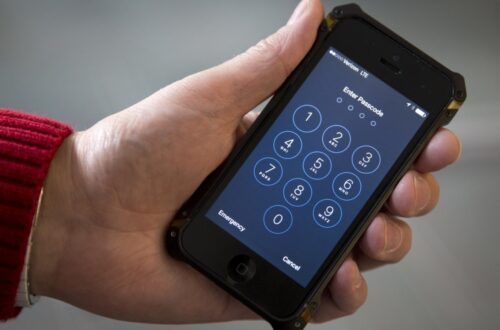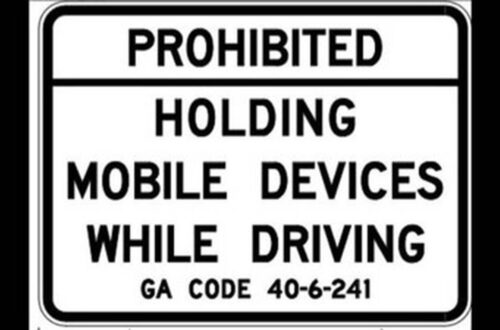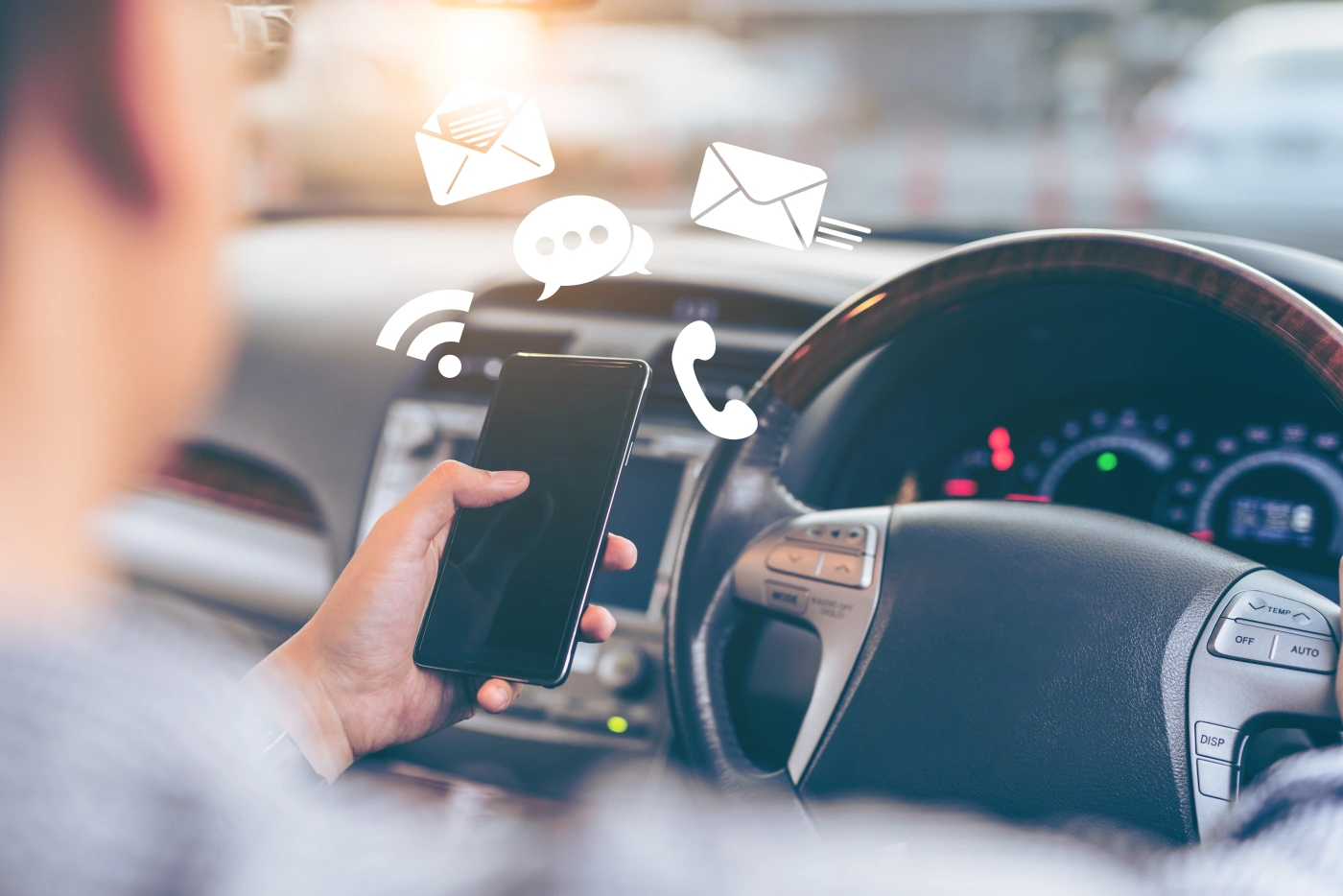Texting and driving greatly heightens the chances of car accidents and puts lives in jeopardy. Distractions while driving can result in devastating collisions and reduce your focus on the road, heightening the risk of putting yourself and others in danger. Prioritize safety by refraining from texting while driving to make certain your full attention is on the road ahead. Further insights into the dangers of distracted driving are available.
Dangers of Texting While Driving
Texting while driving greatly increases the risk of accidents and fatalities on the road. When you take your eyes off the road to read or send a text, your attention is diverted from the task of driving. This momentary distraction can have severe consequences. Studies have shown that texting while driving makes you 23 times more likely to be involved in a crash. The time it takes to glance at your phone and type out a message might seem short, but in that time, your vehicle could travel the length of a football field if you are driving at highway speeds.
You might believe that you are a skilled multitasker, but when it comes to driving, your full attention is required. Even a split second of distraction can lead to a life-changing event. No text message is worth risking your safety or the safety of others on the road. Remember, it's not just about your driving skills; it's about being responsible and making the right choice to prioritize safety over the urge to check your phone.
Statistics on Distracted Driving Accidents
Distracted driving accidents pose a significant threat to road safety, with alarming statistics highlighting the dangers of divided attention behind the wheel. According to the National Highway Traffic Safety Administration (NHTSA), distracted driving claimed 3,142 lives in 2019 alone. This translates to approximately nine fatalities every day due to distractions like texting, eating, or adjusting the radio while driving. Moreover, NHTSA reported that 8.5% of fatal crashes and 15% of injury crashes in 2019 were attributed to distracted driving.
The dangers of distracted driving extend beyond just fatalities. In 2019, there were an estimated 424,000 people injured in motor vehicle crashes involving distracted drivers. These accidents not only affect the individuals involved but also have broader economic implications, costing billions of dollars in medical expenses, property damage, and lost productivity.
These statistics underscore the critical need for drivers to prioritize attention on the road and eliminate distractions to prevent accidents and save lives.
Impact of Mobile Phone Use on Road Safety
Using your mobile phone while driving greatly increases the risk of road accidents. When you take your eyes off the road to read a text or dial a number, you become distracted and your reaction time slows down considerably. This momentary distraction can have severe consequences, potentially leading to collisions, injuries, or even fatalities.
Research has shown that using a mobile phone while driving impairs your ability to focus on the road ahead. Even a quick glance at your phone can cause you to miss important details such as upcoming traffic signals, pedestrians crossing the street, or sudden changes in road conditions. This lack of attention increases the likelihood of accidents occurring.
Furthermore, the physical act of holding a phone while driving can also impair your ability to steer the vehicle properly. Taking one hand off the wheel to use your phone reduces your control over the car, making it harder to react quickly in case of emergencies.
Cognitive Effects of Texting and Driving
Engaging in texting while driving can severely impact your cognitive abilities on the road. When you divert your attention to read or send a text message, your brain is no longer fully focused on the complex task of driving. This divided attention can lead to slower reaction times, decreased awareness of your surroundings, and impaired decision-making skills. Your brain is not designed to effectively multitask in this way, especially when operating a vehicle that requires your full concentration.
Texting while driving can strain your cognitive resources, causing you to miss important visual and auditory cues on the road. Your ability to anticipate and respond to potential hazards is compromised, increasing the likelihood of accidents. Additionally, the mental effort required to compose or interpret a text message can detract from your ability to process critical information while driving. Remember, your safety and the safety of others depend on your undivided attention while behind the wheel.
Legal Implications for Distracted Driving
Considering the seriousness of the issue, understanding the legal implications of texting and driving is essential. When it comes to distracted driving, the consequences can be severe, both regarding safety and the law. Here are some key legal implications to keep in mind:
- Fines: Texting while driving is illegal in many states and can result in hefty fines if caught.
- Points on License: Violations related to distracted driving often come with points added to your driving record, potentially leading to license suspension or increased insurance rates.
- Legal Ramifications: If involved in an accident due to texting and driving, you could face legal action, fines, and even jail time depending on the severity of the incident.
- Civil Lawsuits: Victims of accidents caused by distracted driving can file civil lawsuits against the responsible party, leading to financial liabilities and potential settlements.
Understanding these legal implications is vital in preventing the dangers associated with distracted driving and ensuring compliance with the law.
Technology Solutions to Prevent Distractions
To address the risks associated with texting and driving, exploring technology solutions that can prevent distractions is a proactive approach. One effective technology solution is the implementation of hands-free systems in vehicles. These systems allow you to make calls, send messages, and control your music without taking your hands off the wheel or eyes off the road. Voice-activated assistants like Siri or Google Assistant can help you stay connected while driving safely. Additionally, some smartphones offer a 'Do Not Disturb While Driving' mode that can automatically detect when you're in a moving vehicle and limit notifications.
Another promising technology is distracted driving detection software. This software uses sensors to monitor your driving behavior and alert you if it detects signs of distraction, such as erratic steering or sudden braking. Some advanced systems can even temporarily disable certain phone functions while you're driving. By utilizing these technology solutions, you can notably reduce the risks associated with distracted driving and contribute to safer roads for everyone.
Public Awareness Campaigns on Texting and Driving
Public awareness campaigns play an important role in educating individuals about the dangers of texting and driving. These campaigns aim to raise awareness, change behavior, and ultimately decrease the number of car crashes caused by distracted driving. Here are four key ways in which public awareness campaigns on texting and driving can make a difference:
- Education: Campaigns provide information on the risks associated with texting and driving, highlighting statistics and real-life stories to emphasize the potential consequences.
- Promotion of Alternatives: They encourage drivers to adopt safer practices, such as pulling over to text or using hands-free devices, promoting responsible behavior behind the wheel.
- Legal Consequences: By informing the public about the legal ramifications of texting and driving, campaigns help individuals understand the penalties they may face if caught engaging in this dangerous behavior.
- Social Pressure: These campaigns work to create a social stigma around texting and driving, making it socially unacceptable and encouraging peer accountability.
Tips to Avoid Texting-Related Car Crashes
To decrease the risk of texting-related car crashes, implementing practical tips while driving can greatly enhance road safety. One pivotal tip is to silence or turn off your phone before starting the car. By eliminating the temptation of incoming notifications, you can focus solely on the road ahead. If you must use your phone for GPS or urgent communication, pull over to a safe location to do so. Additionally, utilizing phone apps that block incoming texts and calls while driving can help minimize distractions.
Another essential tip is to designate a passenger as your 'designated texter' if you need to send a message urgently. Letting someone else handle your phone allows you to concentrate on driving without compromising safety. Furthermore, familiarize yourself with voice-to-text features on your phone to send messages hands-free. Remember, no message is worth risking your life or the lives of others on the road. Prioritize safety by avoiding texting while driving altogether.
Frequently Asked Questions
How Does Texting While Driving Compare to Other Forms of Distracted Driving, Such as Eating or Adjusting the Radio?
When comparing texting while driving to other distractions like eating or adjusting the radio, texting demands more visual, manual, and cognitive attention simultaneously. This makes it riskier and more likely to lead to car crashes compared to other forms of distracted driving.
Are There Specific Age Groups That Are More Prone to Texting While Driving Incidents?
You might wonder if specific age groups are more prone to texting while driving incidents. Research indicates that young adults and teenagers are often more likely to engage in this dangerous behavior compared to older drivers.
What Are the Long-Term Consequences for Individuals Involved in Car Crashes Due to Texting While Driving?
Ignoring the context, long-term consequences of car crashes due to texting while driving can be severe. You risk physical injuries, emotional trauma, financial burdens, and legal repercussions. Prioritize safety and avoid distractions to prevent such outcomes.
How Do Emergency Responders Handle Accidents Caused by Texting While Driving?
When accidents caused by texting while driving occur, emergency responders swiftly assess the scene, provide medical care, secure the area, and gather evidence. Their priority is ensuring the safety and well-being of all involved.
Are There Any Studies on the Psychological Impact of Being Involved in a Car Crash Caused by Texting While Driving?
Studies have shown the psychological impact of being in a crash caused by texting while driving. It can lead to anxiety, PTSD, and even depression. Seeking support and therapy after such an incident is essential for mental well-being.
Conclusion
You now understand the serious risks of texting and driving. Remember, every time you pick up your phone while behind the wheel, you are putting yourself and others in danger. Stay safe on the road by avoiding distractions and focusing on driving. It only takes a split second for a car crash to occur, so make the responsible choice to keep your phone out of reach while driving. Your life and the lives of others depend on it.



